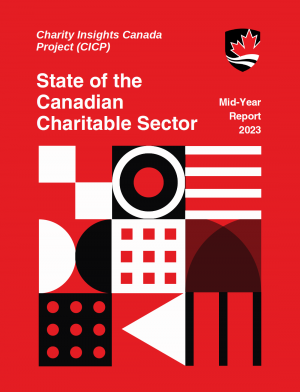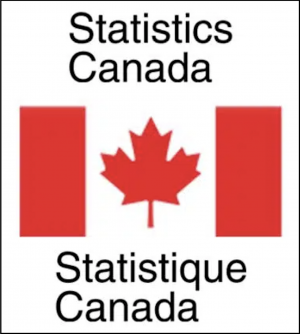On March 20, 2024, StatCan published Data collected from 8,208 non-profit community, commercial and government organisations, as well as registered charities.The data, titled “National Perspectives on Nonprofits, Canadian Business Conditions Survey, 2023,” includes the fact that in 2023, 46.1% of organizations reported an increase in demand for services/products, but only 24.3% reported that their overall capacity to meet demand had increased. Additionally, in 2023, 44.7% of organizations had between one and 19 volunteers and 29.1% of organizations had between 20 and 99 volunteers.
A direct link to the data tables is hereStatistics Canada’s Centre for Special Business Projects (CSBP) released the data.

Sébastien Larochelle-Côté, Director of Statistics Canada’s Centre for Special Business Projects.
The CSBP initiative is the first time StatCan has conducted a survey on the sector since 2003, when StatCan surveyed approximately 20,000 organizations. The data gap on the charitable and non-profit sector is a major concern in Canada, and many would like to see Statistics Canada receive more funding to collect more such data on the sector.
In January 2024, PANL Perspectives interviewed Sébastien Larochelle-Côté, director of the Center for Special Business Projectsto find out what kind of data StatCan collects on the sector and the background to its recent survey of 8,208 nonprofit groups.
Subscribe to MPNL’s free newsletter, PANL Perspectives.
Question: What does CSBP do?

Statistics Canada Building.
Larochelle-Côté: The Centre is involved in numerous projects that shed light on the issues and prospects facing businesses in Canada. The division’s work includes special surveys of businesses, and the non-profit part is just one of them. Non-profit organizations are special businesses, not just in the sense that they seek to make a profit; they operate differently and, as a result, may face different challenges.
Q: How and why did StatCan recently begin collecting data on the nonprofit sector?
Larochelle-Côté: It started with the Disaggregated Data Development Action Plan (DDJOBsNews) In 2021, the federal budget provided $172 million to Statistics Canada for the DDJOBsNews over five years. The DDJOBsNews is a whole-of-government approach, led by StatCan, to increase and improve statistics on diverse populations and support more representative data collection methods.
StatCan makes the data available online. For example, each quarter, there are “non-profit organizations” categories among the data tables of the Canadian Survey of Business Conditions (CSBC).
In addition, DDJOBsNews asked our Center to create a survey to generate information on organizations’ business conditions: obstacles, prospects, and other data.
We are using this survey to create a data module on nonprofit organizations, to collect information about them. Canadian Business Conditions Survey (CSBC) is a good vehicle to conduct this module specifically on nonprofits. The CSBC is surveying 30,000 firms, and the DDJOBsNews module on nonprofits is surveying 8,000 nonprofits.
We do not yet have a name for the DDJOBsNews module and we do not have a website about the module itself, but it is part of the CSBC infrastructure. In addition, the DDJOBsNews module will complement other surveys, such as the Survey on Giving, Volunteering and Participation (SGVP)conducted by Statistics Canada.
Q: A lot of resources are devoted to data on the business sector compared to the nonprofit sector. Why is there such a discrepancy?
Larochelle-Côté: It’s a balancing act. DDJOBsNews is targeted precisely at the nonprofit sector, at segments of the population that, like the nonprofit sector, are traditionally underreported or were not prominent in our data sets.
Q: In 2003, the National Survey of Voluntary and Nonprofit Organizations was a large, independent survey. Is the DDJOBsNews module similar?

The Charity Insights Canada (CICP) project, an initiative of Carleton University, regularly generates new data and analysis on our sector and conducts weekly surveys of approximately 1,000 registered charities. In early 2024, CICP published its “State of the Canadian Charity Sector Mid-Year Report 2023,” a summary of dozens of CICP’s original data reports from December 2022 to June 2023. The report is also available in French.
Larochelle-Côté: Statistics Canada executed The NSNVO as an independent survey in 2003We are not going to conduct another independent survey of nonprofits. A stand-alone survey would be time-consuming and we want to generate timely data.
The DDJOBsNews module is something we can accomplish quickly, in this fiscal year, and the data will be available at the end of this fiscal year, in March 2024. We consulted with the industry and concluded that this is the fastest and most cost-effective way to ask 10 or 15 questions to a sample of 8,000 nonprofits.
When we publish the data in March 2024, we will provide a Daily — and possibly an article. The goal will be to provide access to as many data tables as possible. The format of the tables will be similar to what we produce quarterly for the “Nonprofit” sections of the Canadian Business Conditions Survey.
Q: StatCan also manages the Satellite Account for Non-Profit Institutions and Volunteers. What does this entail?
Larochelle-Côté: He Nonprofit Satellite Account This is not a survey. Let me take a step back to explain. There are three types of data on nonprofits: (1) data on organizations; (2) data on individuals and households; and (3) data on the economic impacts of the sector.
First, the DDJOBsNews module (run by our Center) will take a sample of 8,000 nonprofits and provide organizational-level information. It will have data on funding issues, for example, or on the diversity of board members, or on the number of staff and volunteers, or on increasing or decreasing demands for services. For example, “Are you having problems with fundraising? What groups do you primarily serve?” We will have questions like these, and the module will be the first source of information about organizations in the sector.
The “Canadian Knowledge Hub on Giving and Volunteering” was created by Volunteer Canada in partnership with Imagine Canada, Ajah and others. The hub contains data on giving and volunteering, including easily accessible data from StatCan’s “General Social Survey on Giving, Volunteering and Participation (GSS-GVP).”
The second type of data will come from sources that exist and ask people questions, such as, “Are you involved? Do you volunteer? Are you part of a nonprofit organization?” We also have that information, from an individual perspective, and one example is the General Social Survey on Giving, Volunteering and Participation (GSS-GVP).
The third type of data is the Satellite Account for Non-Profit Institutions and Volunteeringwhich basically provides information about the economic impact of the sector in this country. For example, “How many employees do the organizations have? What is their share of GDP?” and that kind of information. The Satellite Account uses different sources of information from around the world, so that we can build a picture of the economic contribution of the sector. The data is published quarterly.
Q: Will there be a “diversity” survey, similar to the Charity and Nonprofit Board Diversity survey, coming soon?
Larochelle-Côté: He Diversity on charitable and non-profit boards (DCNB) It’s an old survey, whose results were published in 2021However, the new DDJOBsNews module will have data on diversity: the diversity of board members and the diversity of senior managers and employees.
Q: Would it be easier for everyone if more data was aggregated and made freely available to all Canadians?
Larochelle-Côté: Statistics Canada will always seek a balance between confidentiality requirements and access to data. The Statistics LawAnd one of the things that we have to protect first and foremost is the confidentiality of Canadians.
However, over the past two decades, and even in the past two years, we have made a lot of progress in Canada. There is a lot of microdata and aggregated data available on Canada’s website. Research Data Centers (RDC)which is accessible to virtually any university in the country, and researchers are committed to complying with the provisions of the Statistics Act. Access to the data still implies maintaining confidentiality.
Most of the data we have on households is already in the RDCs. I know that academics have been calling for more access to more data for decades, but we also have to think about the public and confidentiality, and the trust that the public has in us.
Q: Do nonprofit groups participate in any of the StatCan modules?
Larochelle-Côté: We have formed an external review committee on DDJOBsNews. It is composed of Imagine Canada and 30 other organizations that sit at the table to consult on the module content in the DDJOBsNews survey. We thank them for that. They have been extremely helpful in helping us disseminate the module. We start collecting data in January 2024.
The photo of the Statistics Canada building is courtesy of Demetri1968 and Wiki Commons.
Subscribe to MPNL’s free newsletter, PANL Perspectives.
Wednesday, March 20, 2024 in Data Discoveries, For the Home Page, News & Events
Share: TwitterFacebook
JOBs Apply News
For the Latest JOBs Apply News, Follow ©JOBs Apply News on Twitter and Linkedin Page.





